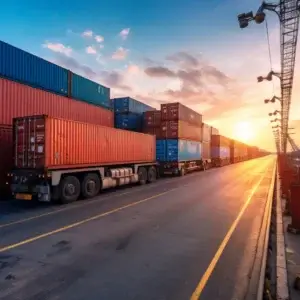In the maritime industry, there is a plethora of service providers that offer similar functions. For instance, two commonly used terms in the context of third-party logistics providers are non-vessel operating common carriers (NVOCCs) and freight forwarders. These service providers play vital roles in the logistics and transportation of goods globally.
Due to many similarities in the services provided by NVOCCs and freight forwarders, it’s common for people to need clarification on how they differ. In addition, both agencies are classified as Ocean Transport Intermediaries by the Federal Maritime Commission, which creates overlapping responsibilities such as cargo documentation, transportation, clearance, and tracking. As a result, it has become increasingly challenging to determine when to engage the services of either an NVOCC or a freight forwarder, making this a significant concern in the maritime industry.
Furthermore, both agencies do not run a carrier or any other freight transport vehicle. Despite the significant similarities between NVOCCs and freight forwarders, both agencies are quite different. And even though they both act as intermediaries between small businesses and shipping lines, they differ in how they operate.
How Do NVOCCs Operate
Non-vessel operating common carriers (NVOCCs) are entities that offer cargo transportation services that are comparable to those provided by shipping lines. However, the significant difference between NVOCCs and shipping lines is that these agencies are non-carrier operators. This means they do not own a vessel. Instead, they establish contracts with shipping companies that operate along predetermined routes and acquire space on their ships.
Typically, the agreements between NVOCCs and shipping lines outline various details, including the volume of business the non-vessel operator will provide within a specific timeframe. The NVOCC’s profitability is also considered when the shipping company determines the rate at which it will offer space on its vessels to the NVOCC.
Non-vessel operating common carriers (NVOCCs) are responsible for producing their own Bill of Lading (BOL). This legal document contains information about the cargo, including its type, quantity, and destination. In addition to their shipping-related duties, NVOCCs provide advisory and expert services to their clients on matters related to freight transportation. Furthermore, some NVOCCs offer storage and warehousing services to customers before shipment and delivery.
What Are Freight Forwarders

Freight forwarders are significantly larger and operate as representatives for both importers and exporters. They aid in building strong connections with numerous cargo carriers, including trucking companies, ocean liners, and airliners.
Freight forwarders manage shipping activities by handling various tasks such as transportation, documentation, and storage, but they differ from NVOCCs in that they act as agents for importers and exporters. Instead of buying space on a vessel, freight forwarders negotiate the most favorable transportation prices with shipping lines and determine the optimal route for cost and speed.
Because importing and exporting are complex processes that require significant paperwork, considerations, and procedures, they can be very challenging for individuals with little experience. Therefore, freight forwarders offer their services to handle all of these processes on behalf of their clients. This is perhaps why people sometimes confuse them for actual shippers.
Significant Contrasts Between NVOCCs and Freight Forwarders
We have now discussed the definitions and primary functions of both NVOCCs and freight forwarders. Although these agencies have comparable responsibilities, they are distinct entities. Therefore, examining and understanding the significant differences between the two agencies is crucial.
The most significant difference between NVOCCs and freight forwarders results from their mode of operation and associations with shipping lines, customers, and other cargo carriers. NVOCCs act as intermediaries between businesses and shipping lines and produce their HBL for the shipper. However, freight forwarders are authorized to manage all operations and make significant decisions on behalf of the shipper.
Here is a summary of some additional dissimilarities between these two agencies.
- Registered Associations
NVOCCs function as autonomous entities without formal connections or memberships aside from an acknowledgment by the International Chamber of Commerce. On the other hand, freight forwarders are linked with the International Federation of Freight Forwarders Association. They must comply with all FIATA regulations and codes of conduct when conducting their operations.
- Responsibilities
NVOCCs serve as carriers for shippers. This means they are responsible for transporting cargo by shippers and are considered the cargo’s primary carrier. On the other hand, freight forwarders are seen as representatives or intermediaries of businesses that arrange for the transportation of goods through various carriers such as shipping lines, airlines, and trucking companies.
In simpler terms, NVOCCs are responsible for the physical transportation of cargo. At the same time, they manage the logistics and paperwork associated with transporting goods from one place to another.
- Associated Components
NVOCCs typically transport freight in a container they have paid for. Some agencies also possess and transport cargo using their containers. They do not, however, offer storage and warehousing services, except for a few large-scale operators. On the other hand, freight forwarders do not require containers but must provide clients with storage and warehousing solutions.
- Rate Negotiation
The rates charged by NVOCCs are determined by their agreements with the shipping lines they use, ultimately impacting the prices offered to their clients. However, freight forwarders are responsible for determining the most efficient shipping route and negotiating favorable rates with carriers on behalf of their clients.
Although non-vessel operating common carriers (NVOCCs) and freight forwarders may provide similar services, the nuances of each service highlight their distinct differences. Businesses need to have a complete understanding of both providers to determine which agency is suitable for their unique needs and requirements.
One way to differentiate between the two is by examining the bill of landing. NVOCCs provide their clients with a House Bill of Lading (HBL), while freight forwarders receive a Masters Bill of Lading (MBL) directly from the shipping line. This distinction emphasizes the roles of NVOCCs as carriers and freight forwarders as agents.
Deciding Between NVOCCs and Freight Forwarders.
After comprehending the distinctions between NVOCCs and freight forwarders, the next step is determining which service aligns with your requirements. The choice between NVOCCs and freight forwarders hinges on crucial factors mainly your scope of work.
The initial factor to consider when deciding is the range of services offered. You need to assess the services you require and choose an agency that can provide them. Furthermore, the cost is another crucial factor to consider. You can select the provider that offers cost-effective services based on your needs.
For instance, small and medium-sized businesses often lack enough goods to fill an entire container. As such, they opt for NVOCCs allowing them to share containers with other clients and cut costs. On the other hand, larger companies have more negotiating power and might find it more advantageous to use the services of freight forwarders.
Sometimes, the choice between NVOCCs and freight forwarders is limited by availability. Choosing the available option based on your cargo type may be prudent rather than waiting for the ideal provider.
Conclusion
Understanding the differences between Non-Vessel Operating Common Carriers (NVOCCs) and Freight Forwarders is essential in making an informed decision as a business owner, importer, or exporter. While both offer similar services, their operations have critical disparities, such as container ownership, associations, and bill of lading used.
It is essential to consider factors that significantly affect your operations to choose the best provider for your needs. Sometimes, due to the dynamic nature of logistics, a single provider may offer NVOCC and freight forwarding services. Ultimately, careful considerations and research are necessary to make the best decision for your business.





